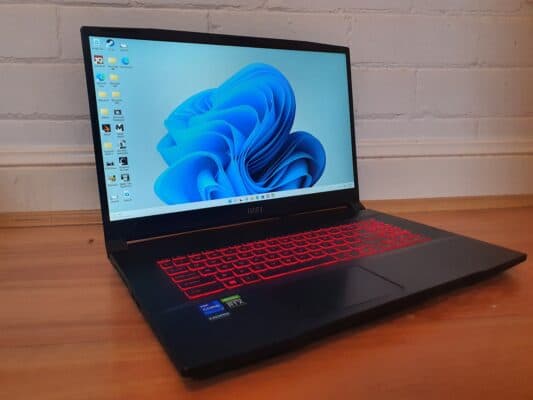Gaming Laptops, Blog
Gaming Laptops vs PC: Which Reigns Supreme?
As an avid gamer, I’m often asked – should I get gaming laptops vs PC for the ultimate experience? It’s a great question with pros and cons to each option. Let me share my insights as someone who has gamed on both setups for years.
I’ll never forget the first bulky gaming laptop I bought in college. After having a clunky desktop through high school, I was psyched at the portability – I could play from anywhere! However, I quickly realized laptop gaming also had compromises. Limited upgradability, overheating issues, weaker performance compared to desktops, and battery life problems were frustrations.
When I built my own custom desktop a few years later, the difference was astounding. With top-tier components like a high-end GPU, CPU, cooling system, and RAM, I could crank game settings to ultra and not crash. Upgrades were a cinch too. The only downside was lack of portability being tied to my desk.
For serious, hardcore gaming, a decked-out desktop PC still can’t be beat in my experience. But gaming laptops have come a long way in power and heat management. Ultimately, it comes down to your priorities and budget. Keep reading for a deeper dive into the gaming PC vs gaming laptop debate.
KEY TAKEAWAY
Gaming laptops vs PC, which is better?
Gaming laptops offer portability and convenience, allowing gamers to enjoy their favorite games on the go (1). On the other hand, gaming PCs provide superior performance and customization options, making them ideal for hardcore gamers seeking the ultimate gaming experience.
Comparing Gaming Laptop and Desktop Performance

Source: Toasty Bros
When it comes to raw gaming power, high-end desktop PCs still outmatch even the most advanced gaming laptops (2). Those beefy desktop components like GPUs, CPUs, cooling, and more just can’t be crammed into a compact laptop body.
In my experience, gaming desktops excel at pushing high resolution, high FPS gameplay with all settings maxed out. We’re talking 4K at over 100 FPS if you’ve got the right hardware. Laptops often have to dial graphics back to 1080p and 60 FPS to prevent overheating and crashes.
Benchmarks consistently show a performance gap too. Gaming laptops average 20-30% lower FPS on top titles like Cyberpunk 2077. Again, cramped spaces and limited cooling account for this disparity versus desktops. Powerful laptop GPUs like the RTX 3080 mobile still can’t quite match their desktop counterparts.
That said, recent gaming laptops from top brands are impressively capable, leveraging smarter designs. They’re absolutely sufficient for most gamers – just don’t expect equal footing with a tricked-out desktop quite yet. The performance race continues!
Portability and On-the-Go Gaming: Laptop Advantage

When it comes to gaming on the move, laptops have the obvious edge. Just grab and go without worrying about plugging in peripherals or hauling a massive tower around.
I love the flexibility my gaming laptop provides. One moment I’m playing AAA titles at my desk with an external monitor for immersive graphics. But I can also kick back on the couch or at a coffee shop and game without being tethered to my desktop.
Modern laptops also charge fast, some even reaching 50% in 30 minutes. With a capable battery, I can play for at least a few hours away from an outlet. Enough for a long flight or road trip gaming session. Hauling a desktop PC around just isn’t feasible.
Clearly laptops can’t compete with desktops in raw performance. But for gamers who value mobility and convenience, laptop gaming delivers a great on-the-go experience. There are always tradeoffs to consider.
Upgrade Flexibility: Desktop PCs vs. Gaming Laptops
When it comes to upgrading your setup down the road, desktop PCs provide way more flexibility and customization compared to gaming laptops. It’s one of the biggest advantages of a desktop rig.
With a desktop, you can freely swap out the GPU, CPU, RAM, storage, and more as newer components release. Just plug in and play. Accommodating the latest tech is easy with desktops’ spacious cases and standardized parts.
Meanwhile, gaming laptop upgrades are extremely limited. Manufacturers solder and tightly pack everything into the small chassis. At most you may be able to add more RAM or storage. Upgrading the CPU or GPU is next to impossible in most laptops.
This upgradability difference can extend your desktop’s lifespan by years. A good tower case can accommodate generations of new parts. Laptop owners will likely need an entirely new machine once performance starts lagging.
Cost Analysis: Initial Investment and Long-Term Value

When weighing gaming desktops versus laptops, the cost comparison isn’t as simple as it may seem. You have to analyze both upfront costs and long-term value.
High-performing gaming laptops actually aren’t much cheaper, often ringing in between $1500-3000. Pre-built desktops cost around the same, while DIY desktops can cost even less. However, upgrading a desktop over time avoids buying a brand new laptop after a few years.
Additionally, replacing worn-out parts like a laptop battery down the road tacks on hidden costs. With a desktop, you simply swap components out individually. This extended usefulness through upgrades makes desktops a smarter long-term investment for serious gamers.
Of course, portability has its own value too for gamers on the move. Determine what benefits justify the costs for your own needs and budget.
Managing Heat and Cooling: Implications for Performance
One area where desktop PCs shine over gaming laptops is heat management and cooling. With more room to breathe, desktops can disperse heat better and avoid thermal throttling.
Gaming laptops cram high-powered components like GPUs and CPUs into a compact plastic chassis. Even with fans and vapor chambers, temperatures often spike into the 90s or even 100s Celsius during intense gaming sessions, forcing automatic throttling.
Desktops equipped with robust air or liquid cooling can maintain cooler temperatures for longer, sustaining peak speeds and avoiding performance drops or shutdowns. Their spacious cases and dedicated cooling solutions seriously outgun laptops.
For eSports gamers chasing high FPS, or anyone gaming in warm environments, desktop rigs definitely have the thermal edge. Laptop cooling innovations continue improving, but compact form factors limit possibilities.
Gaming Experience: Displays, Input, and Audio Quality
Gaming desktops also provide advantages in immersive display size and quality, responsive inputs, and involving audio over laptops – contributing to an overall superior gaming experience.
Desktop displays can be as massive and high-res as you want – even 4K 144Hz monsters! Laptop screens max out at 17 inches before weight becomes an issue. I also love having a mechanical RGB gaming keyboard and adjustable mouse for optimal control.
Powerful discrete sound cards and surround speaker setups deliver incredible game audio on desktops too. Laptops have integrated sound and tiny drivers that pale in comparison.
For serious competitive and recreational gamers alike, the display, input, and audio advantages of desktop rigs make gameplay incredibly engaging. Portable laptop convenience comes at the cost of immersion.
Customization and Aesthetics: Building Your Ideal Gaming Rig
One of the most enjoyable parts of owning a gaming desktop is the ability to extensively customize the aesthetics to reflect your personal style. With laptops, you’re limited to what the manufacturer offers.
From RGB case fans to colored cables to liquid cooling tubes with glitter, desktops enable you to get creative. Premium cases offer side glass panels to show off your components and lighting. You can theme your perfect battlestation.
Customizing gaming laptops is much more limited – you may be able to change the keyboard backlight color, that’s about it. The freedom desktops provide through mix-and-match parts creates a more personalized gaming sanctuary.
Building and designing a gaming desktop you love aesthetically enhances the entire experience. Expressing your unique flair is part of the fun!
Future-Proofing Your Gaming Setup: Looking Ahead
One final consideration is future-proofing. How easily can each setup adapt to tomorrow’s games and tech? Again, desktop PCs are the more future-friendly choice.
Gaming desktops allow you to incrementally upgrade components like GPUs, CPUs, RAM, etc. piece by piece. You can steadily update to maintain performance without replacing the entire rig.
Laptops are far more limiting, with very few upgradable parts beyond storage and RAM. To play new titles over time, you’ll invariably need to purchase an entirely fresh laptop in just a few years.
For gamers who want to maximize their investment and stay equipped for the long haul, crafting an upgradable high-end desktop is the smartest play. It can evolve along with the future of gaming.
Conclusion
After comparing gaming PCs and laptops, a few key takeaways stand out. Desktops offer superior upgradability, cooling, and customization for top performance. But laptops provide portability and compactness at a trade-off of slightly lower capabilities.
Consider what matters most – power or transportability? If you need ultra settings and high FPS for competitive esports, a desktop is likely the better choice. If you want to game in multiple rooms of your home or while traveling, go for a laptop.
Whichever you choose, look for a high-end GPU, enough RAM and storage space, sufficient cooling, and future upgradability. Shop smartly within your budget for the best bang for your buck. With the right set-up, it’s game on!
I hope this overview helps you decide between a gaming PC and laptop for your needs. Let the fragging begin.
If you are wondering whether gaming laptop is good for work, then check out the article.
References
- https://www.ign.com/articles/gaming-laptop-vs-gaming-pc
- https://www.tomshardware.com/features/gaming-desktop-vs-gaming-laptop
Related Articles
- https://workrift.com/are-gaming-laptops-good-for-everyday-use/
- https://workrift.com/why-does-my-gaming-laptop-have-low-fps/
- https://workrift.com/are-gaming-laptops-good-for-work/


